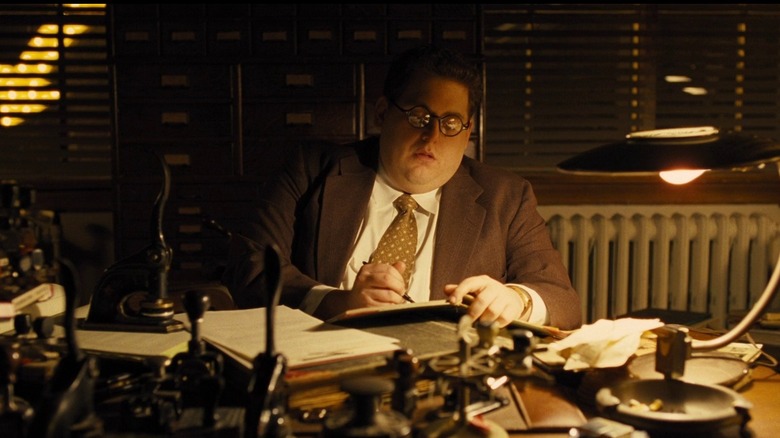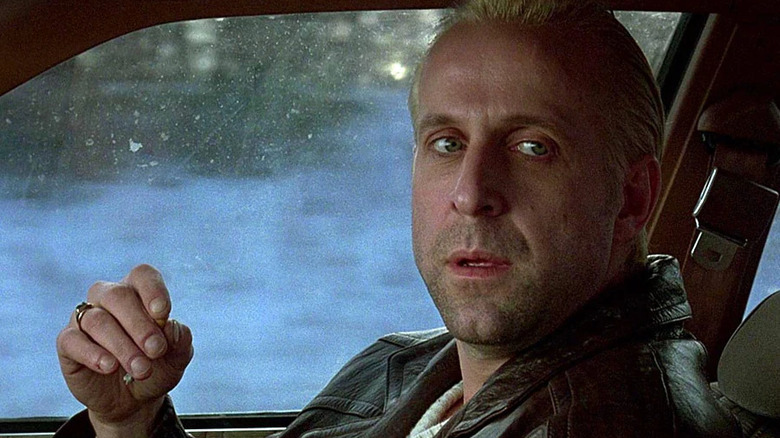Jonah Hill's Hail, Caesar! Ad-Libs Frustrated The Coen Brothers Greatly
Making a film is like building a house; the script is the blueprint, the dailies are the materials, and then editing is the construction itself. Joel and Ethan Coen, who like their films to be exactly what they envisioned, understand this, and so they prefer to oversee every part of the process. They not only write and direct their films, they almost always edit them too using the pseudonym "Roderick Jaynes." Jonah Hill learned how exacting the Coens could be on the set of "Hail, Caesar!", where they were having no patience for ad-libbing or slip-ups.
Hill plays Joseph Silverman, a surety agent and professional fall guy employed by Capitol Pictures in the 1950s. When starlet DeeAnna Moran (Scarlett Johansson) becomes pregnant without a husband to show for it, Silverman agrees to be the child's foster parent. Silverman winds up getting ahead in the deal; Moran's in search of a "reliable" man and by the film's end, they're married. Silverman is only in a single scene, but the Coens still wanted Hill to deliver his scant dialogue precisely as they wrote it.
The right lines
During an interview on the Howard Stern show, Hill was asked about how he handles doing multiple takes of a scene and admitted, "I never stick to the line." The Coen Brothers tested that. While shooting his "Hail, Caesar!" scene, Hill kept slightly flubbing a line. Here's what happened:
"Ethan Coen walks up to me after he had told me a couple times, like, 'You know, this is the line,' or whatever, and I just kept botching this one line. And he came up to me, and he just put his hand on my shoulder and goes, because he's very quiet, and he's just like, 'Jonah, you're, um, you're actually, um ... You're killing me. I'm gonna die and pass away because you didn't say it how I wrote it. I want you to say it.'"
Hill isn't the first actor who's learned how exacting the Coen Brothers can be; the cast of "Fargo" can attest to it as well. In a behind-the-scenes feature on that film's making, "Minnesota Nice," Frances McDormand noted, "[All of the dialogue] was built in, down to every 'yah'," while William H. Macy said, "By and large, every word I said they wrote [...] all the broken sentences, the cutting back on yourself, they wrote it, they wrote every word of it."
The actor who had an experience most like Hill's later one was Peter Stormare. He recounted:
"One of my first lines were, 'where is the pancakes house?' [...] it's gotta be pancake house, and then when we were doing the scene I said 'where's the pancake house,' and Ethan [went] 'Peter, what were you saying there?' 'Where's the pancake house?' 'No, it says pancakes house.' 'Oh, I thought it was a typo.' 'No, no, there's no typos in our scripts."
Painting versus experimenting
Hill's experience didn't diminish his opinion of the Coens; he called them "some of [his] heroes" and said their writing is Pulitizer Prize-worthy during the Howard Stern interview. He compared them to Quentin Tarantino (Hill cameoed as a KKK member in "Django Unchained"), another writer-director whose dialogue is as idiosyncratic as the Coens'. Hill said, "In those two movies, it maybe could've been any decent actor in that role, because [The Coens and Tarantino are] such — they're so brilliant, you're in their painting."
Hill contrasted his experiences on "Hail, Caesar!" and "Django Unchained" with "The Wolf of Wall Street." In that film, Hill had by far the biggest part as Donnie Azoff, a corrupt stockbroker and partner-in-crime of the titular wolf Jordan Belfort (Leonardo DiCaprio). By working with Martin Scorsese, Hill learned how flexible a storyteller he is:
"The coolest thing about Martin Scorsese ever is he just loves to see what you're gonna do. He enjoys it. He loves to see and be surprised. I don't want to speak for him, but that's the impression I got [...] That's why you would hire me if you want to see things evolve [...] the best advice I got from watching Martin Scorsese was kind of like, 'Get out of the movie's way.'"
"The Wolf of Wall Street" is about the chaos of an excessive lifestyle, so Scorsese's free-styling approach fit the material. To succeed a director has to know what they want. Even if they aim for different things, Martin Scorsese, Quentin Tarantino, and the Coen Brothers clearly do know exactly what they want.


